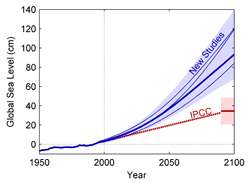Studies agree on a 1 meter rise in sea levels

New research from several international research groups, including the Niels Bohr Institute at the University of Copenhagen provides independent consensus that IPCC predictions of less than a half a meter rise in sea levels is around 3 times too low. The new estimates show that the sea will rise approximately 1 meter in the next 100 years in agreement with other recent studies. The results have been published in the scientific journal, Geophysical Research Letters.
Since IPCC published the predictions in 2007, that the sea would rise less than half a metre in the next 100 years, it became clear that there was a problem with the prediction models as they did not take into account the dynamic effects of the melting ice sheets. The estimates were therefore too low.
Better prediction models
However, the new model estimates, from international research groups from England, China and Denmark, give independent support for the much higher predictions from other recent studies.
”Instead of using temperature to calculate the rise in sea levels, we have used the radiation balance on Earth - taking into account both the warming effect of greenhouse gasses and the cooling effect from the sulfur clouds of large volcanic eruptions, which block radiation”, explains Aslak Grinsted, PhD in geophysics at the Centre for Ice and Climate, the Niels Bohr Institute at the University of Copenhagen.
The research is based on observations of sea levels from the 1700s to the present and estimates of the radiation balance through approximately 1000 years.
The sun’s heat varies periodically and currently there is a solar minimum, but even if solar radiation were to reach its lowest level in the past 9300 years, it will have only a minimal impact on sea levels. Some have suggested that you could inject sulfur into the atmosphere and get a kind of artificial volcanic eruption cooling effect, but the calculations show that it would only slow down the rise in sea levels for 12-20 years. What are important are greenhouse gasses like CO2, the research shows.
Reduced emissions
The results are that the sea level will rise between 0.7 and 1.2 meters during the next 100 years. The difference depends on what mankind does to stop the emission of greenhouse gases into the atmosphere. If we seriously reduce the emissions of CO2 globally, the sea will only rise 0.7 meters, while there will be a dramatic rise of 1.2 meter if we continue indifferent with the current use of energy based on fossil fuels.
In the calculations the researchers assume that we continue to emit CO2, but that we move more towards other energy supplies and reduce our use of fossil fuels and with that reduce the emission of greenhouse gases. This scenario would give a rise in sea levels of around 1 meter.
Other energy sources important now
Even a one meter rise in sea levels would have a big impact in some places in the world with low lying areas, which will become much more susceptible to extreme storm surges, where water could easily sweep over the coasts.
”The research results show that it is therefore important to do something now to curb the emission of CO2 - there is about a half meter difference in sea level depending on whether nations of the world continue to pump greenhouse gases from fossil fuels into the atmosphere or whether we slam on the brakes and use other energy sources”, explains Aslak Grinsted.
More information: Paper: dx.doi.org/10.1029/2010GL042947
Provided by Niels Bohr Institute
















